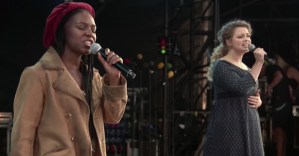
© Bronwen Sharp
Evan Placey's assured debut play, here receiving its first London outing since its premiere at the Courtyard Theatre in 2010, centres on a family under siege.
The "him" of the title is a teenage boy accused of a heinous crime, and now his mother and younger brother can't leave the house without being greeted by a hail of camera flashes. As the accused shelters in his bedroom, his family must face up to the reality of his misdeeds.
Set in Toronto in the late 90s, the play touches on a number of issues, not least the lengths to which a mother's love can be stretched. As Brenda Kapowitz, the mother of the title, Tracy Ann Oberman effectively portrays an otherwise ordinary woman brought to her knees by the sins of her son.
The family are Jewish, and the fact the action takes places around Hanukkah adds to the poignancy of their plight. With normal life on hold they cling to tradition for rare moments of togetherness. In one particularly affecting scene the younger son's eighth birthday candles are symbolically burned in the menorah.
Max Lindsay's production effectively captures the feeling of claustrophobia the family experience. The unseen outside world encroaches in sinister ways, from the constant ringing of the telephone to the hate mail streaming through the letterbox. But it can be a little clunky, particularly during protracted scene changes as the tetris-like set is rearranged into the different rooms of the house.
At its heart is an outstanding performance from Oberman, who brilliantly captures Brenda's toxic mixture of maternal guilt, abhorrence at her son's actions and fear for his possible incarceration. She packs a devastating emotional punch, particularly in the play's climactic moments. And she is well supported by Scott Folan and Matt Goldberg (on press night), who show great poise as brothers Matthew and Jason.
The play at times betrays the rawness of its writer, not least in the drawing of its minor characters. Neither the boy's lawyer (Simon Hepworth), girlfriend (Anjelica Serra) or father (Neil Sheffield) ring especially true, and at times stray close to cliché. And it never really delves into the motives for the son's actions. But in some ways this is its strength. By never placing blame on anyone's shoulders in particular the piece heightens our sympathies for the mother and draws a frightening conclusion; this could happen to any parent.



















